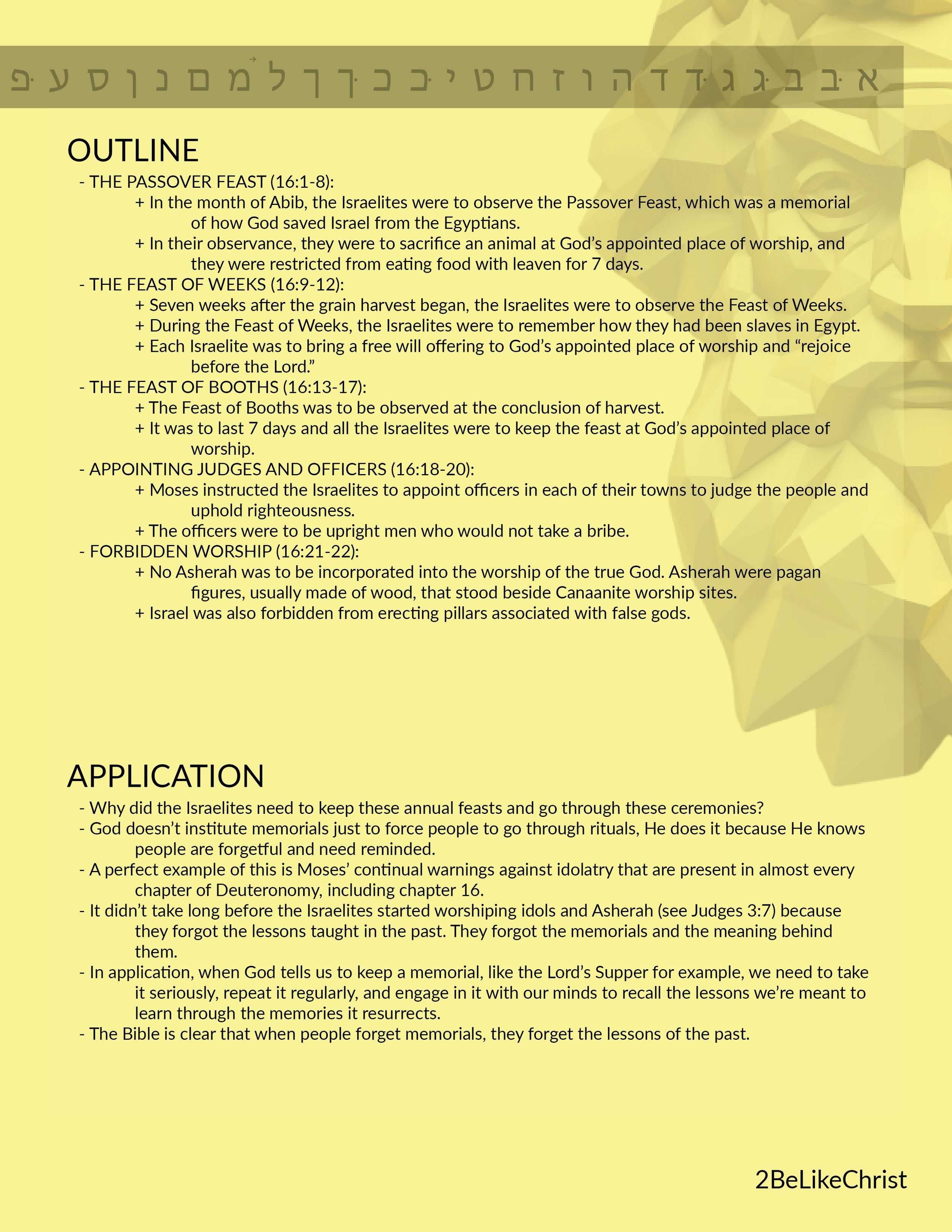Deuteronomy 16 Summary - 5 Minute Bible Study
Deuteronomy 16 Summary - A Quick Overview
WHEN:
Moses’ speech, recorded in the opening chapters of Deuteronomy, occurred immediately following the Israelites’ 40 years of wandering in the wilderness.
The Israelites were in the wilderness from approximately 1490-1450 B.C.
The Book of Deuteronomy opens on the 1st day of the 11th month in the 40th year (Deu 1:3) following the Israelites departure from Egypt (approximately 1450 B.C.).
CHARACTERS:
Israelites (Hebrews) – The descendants of Abraham, Isaac, and Jacob. God granted them freedom after several hundred years in slavery in Egypt. Leading up to the book of Deuteronomy, the Israelites had spent 40 years wandering in the wilderness as they made their way to Canaan, the land God promised to give them as a home.
Moses – Moses was selected by God to lead the Israelites to Canaan. God spoke directly to Moses and Moses communicated God’s words and laws to the people.
WHERE:
Deuteronomy 1:5 tells us Moses spoke the words recorded in Deuteronomy while in Moab, probably on the plains of Moab near Pisgah (Numbers 22:1).
OUTLINE:
THE PASSOVER FEAST (16:1-8):
In the month of Abib, the Israelites were to observe the Passover Feast, which was a memorial of how God saved Israel from the Egyptians.
In their observance, they were to sacrifice an animal at God’s appointed place of worship, and they were restricted from eating food with leaven for 7 days.
THE FEAST OF WEEKS (16:9-12):
Seven weeks after the grain harvest began, the Israelites were to observe the Feast of Weeks.
During the Feast of Weeks, the Israelites were to remember how they had been slaves in Egypt.
Each Israelite was to bring a free will offering to God’s appointed place of worship and “rejoice before the Lord.”
THE FEAST OF BOOTHS (16:13-17):
The Feast of Booths was to be observed at the conclusion of harvest.
It was to last 7 days and all the Israelites were to keep the feast at God’s appointed place of worship.
APPOINTING JUDGES AND OFFICERS (16:18-20):
Moses instructed the Israelites to appoint officers in each of their towns to judge the people and uphold righteousness.
The officers were to upright men who would not take a bribe.
FORBIDDEN WORSHIP (16:21-22):
No Asherah was to be incorporated into the worship of the true God. Asherah were pagan figures, usually made of wood, that stood beside Canaanite worship sites.
Israel was also forbidden from erecting pillars associated with false gods.
APPLICATION:
Why did the Israelites need to keep these annual feasts and go through these ceremonies?
God doesn’t institute memorials just to force people to go through rituals, He does it because He knows people are forgetful and need reminded.
The perfect example of this is Moses’ continual warnings against idolatry that are present in almost every chapter of Deuteronomy, including chapter 16.
It didn’t take long before the Israelites started worshiping idols and Asherah (see Judges 3:7) because they forgot the lessons taught in the past.
In application, when God tells us to keep a memorial, like the Lord’s Supper for example, we need to take it seriously, repeat it regularly, and engage in it with our minds to recall the lessons we’re meant to learn through the memories it resurrects.
The Bible is clear that when people forget memorials, they forget the lessons of the past.


